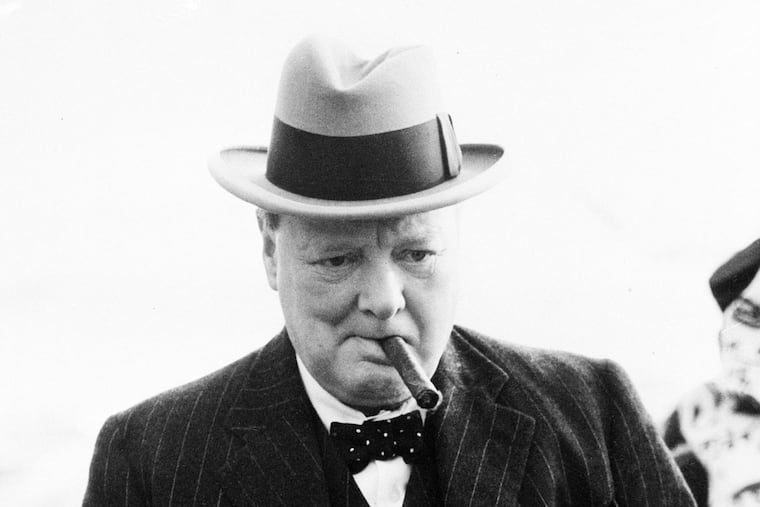Medical mystery: Winston Churchill's most secret battle
During World War II, Prime Minister Winston Churchill, inspired the United Kingdom - and much of the rest of the world - with his strength and certainty that the Allies would defeat the Nazis. But his own body threatened to betray him.

During his nation's "darkest hours" in World War II, Prime Minister Winston Churchill, inspired the United Kingdom – and much of the rest of the world – with his strength and certainty that the Allies would defeat the Nazis, however hard the struggle.
"We shall fight on the beaches, we shall fight on the landing grounds, we shall fight in the fields and in the streets, we shall fight in the hills; we shall never surrender," the 65-year-old prime minister intoned on June 18, 1940, in his "Finest Hour" speech, as the Battle of Britain was about to begin.
Few knew that as a youngster, the man whose soaring oratory would mean so much to so many suffered from a stammer, a speech disorder that is notoriously difficult to overcome. Prime example: Britain's wartime King George VI, whose own struggles to control his stammer were the subject of the Oscar-winning 2010 film, "The King's Speech."
Churchill was more successful at mastering the impediment, teaching himself to practice his speeches well in advance, and developing the art of effective, loaded pauses.
But the strains of war showed even on the man called Britain's Bulldog. He suffered a mild heart attack in December 1941 while at the White House shortly after Pearl Harbor to solidify relations with his most important ally, Franklin D. Roosevelt. Two years later, he contracted pneumonia.
Through it all, he enjoyed his trademark cigars and his favorite cocktail, whisky and soda.
Some have thought Churchill was bipolar, sometimes suffering from depression he later would call his "Black Dog," other times exhibiting vast levels of energy, working from early morning to past midnight, often from his bed wearing the pale pink silk underwear he preferred, and even from his bathtub.
After the war, in the summer of 1949, Churchill went to the south of France to rest and enjoy painting the French Riviera. While there, he suddenly lost sensation in his right arm and right leg.
The incident was handled quietly, with a sign stating only that he "contracted a chill while bathing" posted at the villa where he was staying. He rapidly recovered and returned to England.
Churchill once again became prime minister on October 24, 1951. In June 1953, at a dinner to honor the Italian prime minister, Churchill gave a speech, but then suddenly couldn't continue discussion and slumped back in his chair.
His son-in-law noticed he appeared weak on his left side, and quietly got Churchill up to his room.
The next day, after conducting a cabinet meeting, he was driven to Chartwell, his country home in Kent. The public and Parliament were told he was suffering from exhaustion.
What was really going on, and why was it hushed up?
Solution
As his son-in-law noticed at the 1953 dinner, the left side of Churchill's mouth was drooping, and his left arm and leg were weak. This was his second hypertension-related lacunar stroke he suffered; the first was in 1949. This most common type of stroke is caused by blockage of small arteries leading to the brain.
Once at Chartwell, Churchill received around the clock nurse's care and physical rehabilitation. The news blackout during these tense, Cold War times, was maintained; the nation's press barons agreed to keep the secret. The young Queen Elizabeth II was among the few who knew what was going on.
For the better part of a month, "my colleagues and I had to handle requests for decisions from Ministers and Government departments who were entirely ignorant of the Prime Minister's incapacity," his private secretary, Jock Colville, later wrote.
He didn't stay down for long. In December 1953, Churchill went to Bermuda to meet with President Dwight Eisenhower, who was not aware of Churchill's strokes.
Churchill's physician, Lord Moran, his staff and family also kept hidden other events including the "mini-strokes" he suffered in 1950 and 1951. In 1952 a fleeting speech disturbance suggested a spasm or partial occlusion of the artery supplying the speech center of the brain. By then, both the right and left sides of Churchill's brain were affected by atherosclerosis and hypertension.
Recognizing he was slowing down physically and mentally, Churchill retired as prime minister in 1955, but remained in Parliament until 1964.
On Jan. 15, 1965, the 90-year-old Churchill suffered another stroke, which was announced. He died nine days later, and was mourned by millions at a massive state funeral, televised worldwide, to say farewell to the man who may have done more than any other to stop the Nazis.
Allan B. Schwartz, M.D., is a professor of medicine in the Division of Nephrology & Hypertension at Drexel University College of Medicine